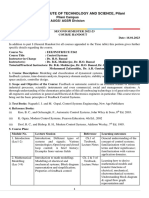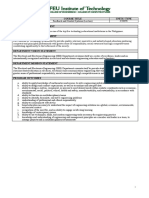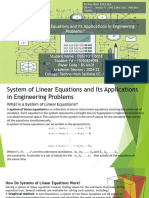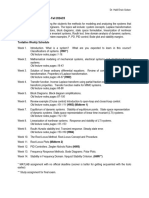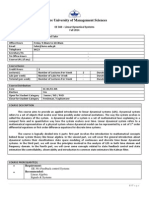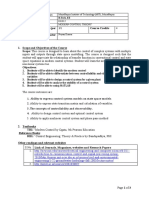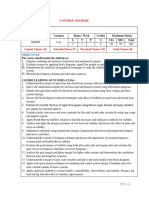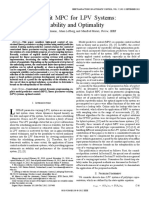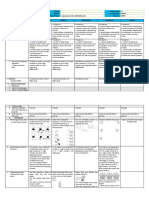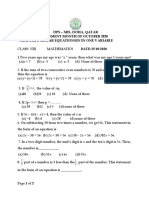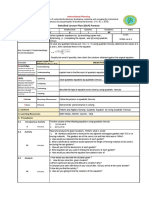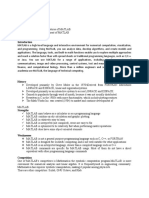Hespana - ECE 230A - ME 243A - LINEAR SYSTEMS THEORY
Hespana - ECE 230A - ME 243A - LINEAR SYSTEMS THEORY
Uploaded by
sirpdcCopyright:
Available Formats
Hespana - ECE 230A - ME 243A - LINEAR SYSTEMS THEORY
Hespana - ECE 230A - ME 243A - LINEAR SYSTEMS THEORY
Uploaded by
sirpdcOriginal Title
Copyright
Available Formats
Share this document
Did you find this document useful?
Is this content inappropriate?
Copyright:
Available Formats
Hespana - ECE 230A - ME 243A - LINEAR SYSTEMS THEORY
Hespana - ECE 230A - ME 243A - LINEAR SYSTEMS THEORY
Uploaded by
sirpdcCopyright:
Available Formats
1/13/2021 ECE 230A/ME 243A- LINEAR SYSTEMS THEORY
E C E 230A/ME 243A
L I N E AR SYSTEMS T H E O RY
M o - We, 10-11:50am, O n l i n e i n s t r u c t i o n
Syl l ab u s
The purpose of this course is to provide the students with the basic tools of modern linear systems theory: stability, controllability, observability, realization theory, state
feedback, state estimation, separation theorem, etc. For time-invariant systems both state-space and polynomial methods are studied. The students will also be introduced to
the computational tools for linear systems theory available in MATLAB. The intended audience for this course includes, but is not restricted to, students in circuits,
communications, control, signal processing, physics, and mechanical and chemical engineering.
Co-requisite
ECE 210A Matrix Analysis and Computation
Graduate level-matrix theory with introduction to matrix computations. SVD's, pseudo-inverses, variational characterization of eigenvalues, perturbation theory, direct and
iterative methods for matrix computations.
Course's web page
The syllabus, homework, solutions to homework, and all other information relevant to the course will be continuously posted at the course's web page. The URL is
http://www.ece.ucsb.edu/~hespanha/ece230a-me243a/
This class will also have a web page in GauchoSpace. PLEASE add you picture to GauchSpace so that I can associate names to faces.
quick l i n k s
SYLLABUS ACADEMICS STUDY GUIDE HOMEWORK ASSIGNMENTS
Ac a de m i c s
I nstr u c t o r
João P. Hespanha
email: hespanha@ece.ucsb.edu
phone: (805) 893-7042
office: Harold Frank Hall, 5157
Office hours: Please email instructor for appointment
Asses s m e n t f o rmat
Homework – 30%
Mid-term exam – 30% (tentatively on Nov 9; "in class")
Final exam – 40% (Monday Dec 14; Phelps 1437 from 8-11am)
Textb o o k
The course will follow closely:
[1] J. Hespanha. Linear Systems Theory, Second Edition, 2018. (ISBN-13: 978-0691179575). Details available here.
Other recommended textbooks are:
[2] P. Antsaklis, A. Michel. Linear Systems. McGraw Hill, 1997.
[3] C.-T. Chen. Linear Systems Theory and Design. Oxford Univ. Press, 3rd ed., 1999. (ISBN 0-19-511777-8)
All students are strongly encouraged to review linear algebra. Chapter 3 of [3] provides a brief summary but a review of a Linear Algebra textbook (such as [4] below) is preferable,
especially if one goes through a few exercises.
[4] Gilbert Strang Linear Algebra and Its Applications, 1988.
St u dy Gu i d e
The following is a tentative schedule for the course. If revisions are needed they will be posted on the course's web page. Students are strongly encouraged to read the corresponding
chapter of the textbook prior to each class.
https://web.ece.ucsb.edu/~hespanha/ece230a-me243a/#Study Guide 1/4
1/13/2021 ECE 230A/ME 243A- LINEAR SYSTEMS THEORY
Class Contents Remarks/Supplemental
material
Introduction and course overview
Lect #1 Systems Representation
10/5 System representation: input-output, block diagrams
Continuous vs. discrete-time
Examples
Where do state-space linear systems come from?
Lect #2
Local Linearization
10/7
Feedback Linearization
Basic system properties: causality, linearity, time-invariance
Lect #3
Forced responses
10/12 Impulse response
Transfer function
Impulse response and transfer function for state-space systems
Lect #4
Definitions
10/14 Elementary realization theory for LTI systems
Equivalent state-space representations
Solution for state-space linear time-varying (LTV) systems
Lect #5 Solution to homogeneous linear systems—Peano-Baker series
State-transition matrix
10/19
Properties of the state transition matrix
Solution to nonhomogeneous linear systems—variations of constants formula
Solution for state-space linear time-invariant (LTI) systems
Lect #6
Matrix exponential (definition and properties)
10/21 Computation of matrix-exponentials using the Laplace transform
The importance of the determinant of A
Solution to state-space linear time-invariant (LTI) systems (cont.)
Lect #7
Jordan normal form
10/26 Computation of matrix-exponentials using the Jordan normal form
Poles with multiplicity larger than one (block diagram interpretations)
Stability
Lect #8
Internal stability of continuous-time LTI systems
Definitions
10/28 Eigenvalues condition (block diagram interpretation of multiplicity)
Lyapunov Theorem (LMI)
Stability of nonlinear systems from local linearization
Input-output stability of LTI systems
Lect #9
Definition
11/2 Time-domain condition
Frequency-domain condition
Preview of optimal control
Lect #10 Linear quadratic regulator problem
Algebraic Riccati equation
11/4
Optimal state-feedback control
Stability
In class midterm exam on the material covered up to (and including)
11/9
lecture #9 of the textbook.
11/11 Veteran's day (no class)
Lect #11
Controllability and State Feedback
11/16
Reachability and controllability subspaces for LTI systems
https://web.ece.ucsb.edu/~hespanha/ece230a-me243a/#Study Guide 2/4
1/13/2021 ECE 230A/ME 243A- LINEAR SYSTEMS THEORY
Controllability matrix
Open-loop minimum energy control
Controllability matrix
Open-loop minimum energy control
Controllable systems
Definition
Lect #12 Controllability matrix test
Popov-Belevitch-Hautus (PBH) test
11/18
Eigenvector/eigenvalue test
Lyapunov test (LME)
Feedback stabilization based on the Lyapunov test
Canonical decompositions
Lect #13
Invariance with respect to equivalence transformations
11/23 Controllable canonical form for single-input systems
Controllable decomposition
Stabilizability
Definition
Popov-Belevitch-Hautus (PBH) test
Eigenvector/eigenvalues test
Lect #14
Lyapunov test (LMI)
11/25 Lyapunov test-based control
Eigenvalue assignment
Controllable case
Stabilizable case
Observability and Output Feedback
Observability
Lect #15
Observability and constructibility
11/30 Physical examples & block diagrams
Observability/constructibility Gramians
Gramian-based reconstruction
Duality
Observability tests
Output feedback
Detectability
Lect #16 Observable decomposition
Detectability tests
12/2
State estimation
Eigenvalue assignment by output injection
Stabilization through output feedback—separation theorem
Minimal realizations
Lect #17 Markov Parameters
Kalman decomposition Theorem
12/7
Connection with controllability/observability
Equivalence of minimal realizations
Lect #17
TBD
12/9
Final Exam
12/14 The final exam will take place on Monday Dec 14, 8:00-11:00am.The exam is closed
book, but during the exam you are allowed to consult one letter-size piece of paper
with handwritten notes.
Hom ew or k A ssi g n m e n t s
Number Posted on Due date Exercises Relevant lectures
9/4 See Gauchospace
#1 Download exercises from here #1, #2
Please organize your answer along the lines of
the practice exercises that appear in Section 2.5
https://web.ece.ucsb.edu/~hespanha/ece230a-me243a/#Study Guide 3/4
1/13/2021 ECE 230A/ME 243A- LINEAR SYSTEMS THEORY
of the textbook (also here).
#2 #3, #4
#3 #5, #6, #7
#4 #8, #9
#5 #11, #12
#6 #13, #14
#7 #15, #16, #17
https://web.ece.ucsb.edu/~hespanha/ece230a-me243a/#Study Guide 4/4
You might also like
- Worksheet On Expected Value Variance and Standard DeviationDocument2 pagesWorksheet On Expected Value Variance and Standard DeviationTerrence Matthew Calixtro100% (1)
- Circle TheoremDocument8 pagesCircle Theoremapi-291428736No ratings yet
- CIS Control Technology-Theory-Spring-2021Document6 pagesCIS Control Technology-Theory-Spring-2021mishal shakeelNo ratings yet
- Control CoDocument5 pagesControl CoabubekabdulaziztemamNo ratings yet
- Increased Roles of Linear Algebra in Control EducationDocument15 pagesIncreased Roles of Linear Algebra in Control Educationsantoshraman89No ratings yet
- Ae ZG535 Course HandoutDocument4 pagesAe ZG535 Course HandoutsandeshNo ratings yet
- Stability Analysis of A Class of NonlinearDocument5 pagesStability Analysis of A Class of NonlinearsonabNo ratings yet
- 20EC1115Document2 pages20EC1115Aditi KarvekarNo ratings yet
- Gujarat Technological University Biomedical EngineeringDocument3 pagesGujarat Technological University Biomedical EngineeringMandy745No ratings yet
- ELE2103 Linear Systems and Control: Introductory BookDocument39 pagesELE2103 Linear Systems and Control: Introductory BookkaneNo ratings yet
- Course Specification - EEE-3501Document4 pagesCourse Specification - EEE-3501Tanzim MushtaryNo ratings yet
- EE 340 Control Systems: Schedule SemesterDocument3 pagesEE 340 Control Systems: Schedule Semesteranon_897005027No ratings yet
- Introduction To Control System Course OutlineDocument5 pagesIntroduction To Control System Course OutlineGemechisNo ratings yet
- Control Systems - EE410Document2 pagesControl Systems - EE410Waqas AfzalNo ratings yet
- Syllabus GTU PDFDocument3 pagesSyllabus GTU PDFkalpesh_chandakNo ratings yet
- Gujarat Technological University: W.E.F. AY 2018-19Document3 pagesGujarat Technological University: W.E.F. AY 2018-19Alok MauryaNo ratings yet
- Ortega2015 ObserverDocument11 pagesOrtega2015 ObserverdidoumaxNo ratings yet
- EE 340 Control Systems: Schedule Course Type, SemesterDocument5 pagesEE 340 Control Systems: Schedule Course Type, SemesterArbab HaiderNo ratings yet
- CONSYSDocument3 pagesCONSYSADITYA MATHURNo ratings yet
- syllabus of lstDocument3 pagessyllabus of lstshashankyadav5674No ratings yet
- EEE - 2297 - Online - Lecture - 7 - MMH (19 Series)Document22 pagesEEE - 2297 - Online - Lecture - 7 - MMH (19 Series)Raihanul Haque RahiNo ratings yet
- XVXZVDocument4 pagesXVXZVJojo CansinoNo ratings yet
- Network Analysis and Synthesis PDFDocument2 pagesNetwork Analysis and Synthesis PDFAnonymous Zzx3FSfpNo ratings yet
- Network Analysis and Synthesis PDFDocument2 pagesNetwork Analysis and Synthesis PDFSomrita sarkarNo ratings yet
- Network Analysis and Synthesis PDFDocument2 pagesNetwork Analysis and Synthesis PDFMayank TiwariNo ratings yet
- Network Analysis and Synthesis PDFDocument2 pagesNetwork Analysis and Synthesis PDFGuntupalli RamaniNo ratings yet
- Network Analysis and Synthesis PDFDocument2 pagesNetwork Analysis and Synthesis PDFLakum Hitesh100% (3)
- 13030824098_Debjyoti Bose_BS-M101_CA1Document10 pages13030824098_Debjyoti Bose_BS-M101_CA1dhartirtharaj51No ratings yet
- SyllabusDocument3 pagesSyllabusPriteshShahNo ratings yet
- Feedback Control Systemsion Introduction PDF FreeDocument29 pagesFeedback Control Systemsion Introduction PDF Freemuhaiminyusufanwar910No ratings yet
- Syllabus 6 EeeDocument11 pagesSyllabus 6 EeeSUMIT RAJNo ratings yet
- On A New Four-Dimensional Model of Memristor-Based Chaotic Circuit in The Context of Nonsingular Atangana-Baleanu-Caputo OperatorsDocument24 pagesOn A New Four-Dimensional Model of Memristor-Based Chaotic Circuit in The Context of Nonsingular Atangana-Baleanu-Caputo OperatorsRahul VishwakarmaNo ratings yet
- CS SyllabusDocument2 pagesCS SyllabusEEE ACEECNo ratings yet
- An Algorithmic Solution To The Discrete-Time Cheap and Singular LQR ProblemsDocument8 pagesAn Algorithmic Solution To The Discrete-Time Cheap and Singular LQR ProblemsShim JakeNo ratings yet
- Analysis and Synthesis of Discrete-Time Systems: Sharif University of TechnologyDocument16 pagesAnalysis and Synthesis of Discrete-Time Systems: Sharif University of Technologymadiha mimiNo ratings yet
- 00 Course OutlineDocument6 pages00 Course OutlineTafadzwa WachenukaNo ratings yet
- IEEE Research Paper On Root Locus Method Simulation On MatlabDocument11 pagesIEEE Research Paper On Root Locus Method Simulation On Matlabraiedhamane369No ratings yet
- 1-Control System Analysis and Design by Chandra, Dinesh Tripathi, A. KDocument720 pages1-Control System Analysis and Design by Chandra, Dinesh Tripathi, A. KHiren Dabhi100% (4)
- Linear Control Systems Course OutlineDocument3 pagesLinear Control Systems Course Outlinekiller raoNo ratings yet
- A Linear Matrix Inequality Approach To Decentralized Control of Distributed Parameter SystemsDocument5 pagesA Linear Matrix Inequality Approach To Decentralized Control of Distributed Parameter SystemsVan Tien LeNo ratings yet
- Ee8501 Psa Unit 3Document81 pagesEe8501 Psa Unit 3sathyasathish535No ratings yet
- AE383 Systems Dynamics - HESoken - 2024 - v1Document2 pagesAE383 Systems Dynamics - HESoken - 2024 - v1emeraldzehraNo ratings yet
- Solving Power System Differential Algebraic Equations Using Differential TransformationDocument11 pagesSolving Power System Differential Algebraic Equations Using Differential Transformationramya sreeNo ratings yet
- CS 3-1Document2 pagesCS 3-1Uggina Narisinga RaoNo ratings yet
- EE 560-Linear Dynamical Systems-Muhammad TahirDocument3 pagesEE 560-Linear Dynamical Systems-Muhammad Tahircoolboy_usamaNo ratings yet
- 6 Semester: Institute of Engineering & ManagementDocument40 pages6 Semester: Institute of Engineering & ManagementManohar PNo ratings yet
- Computation of Dominant Poles and Residue - IEEEDocument12 pagesComputation of Dominant Poles and Residue - IEEERamesh KomarasamiNo ratings yet
- Advanced Control Systems SyllabusDocument2 pagesAdvanced Control Systems SyllabusMulu GirmayNo ratings yet
- Course Handout PDFDocument3 pagesCourse Handout PDFNayan KumarNo ratings yet
- The Use of Matlab in The Solution of Linear Quadratic Regulator (LQR) ProblemsDocument18 pagesThe Use of Matlab in The Solution of Linear Quadratic Regulator (LQR) ProblemsAbdesselem BoulkrouneNo ratings yet
- CS R-16 SyllabusDocument3 pagesCS R-16 SyllabusSai tejaswiNo ratings yet
- CHE F342 Process Dynamics and Control IISem2019-20Document3 pagesCHE F342 Process Dynamics and Control IISem2019-20Surabhi SharmaNo ratings yet
- Circuit Analysis in Time DomainDocument6 pagesCircuit Analysis in Time DomainShiva SanthoshNo ratings yet
- Hoffmann 2015Document18 pagesHoffmann 2015Bouazizi HechmiNo ratings yet
- Ee8501 Psa Unit1Document96 pagesEe8501 Psa Unit1sathyasathish535No ratings yet
- Eee-Vii-computer Techniques in Power System Analysis (10ee71) - Notes123098Document144 pagesEee-Vii-computer Techniques in Power System Analysis (10ee71) - Notes123098Angsuman SharmaNo ratings yet
- Decentralized Nonlinear Model Predictive Control of Multiple Flying RobotsDocument6 pagesDecentralized Nonlinear Model Predictive Control of Multiple Flying RobotsPedro Cezar Rodrigues BaltazarNo ratings yet
- 004 1 EE 232 Signals and SystemsDocument2 pages004 1 EE 232 Signals and SystemsShaharyar WaliullahNo ratings yet
- Explicit MPC For LPV Systems: Stability and OptimalityDocument11 pagesExplicit MPC For LPV Systems: Stability and OptimalityGodofredoNo ratings yet
- Modern Anti-windup Synthesis: Control Augmentation for Actuator SaturationFrom EverandModern Anti-windup Synthesis: Control Augmentation for Actuator SaturationRating: 5 out of 5 stars5/5 (1)
- Multiple Models Approach in Automation: Takagi-Sugeno Fuzzy SystemsFrom EverandMultiple Models Approach in Automation: Takagi-Sugeno Fuzzy SystemsNo ratings yet
- DNM SolnDocument27 pagesDNM SolnManavSaksariaNo ratings yet
- IB Math Higher Level PDFDocument2 pagesIB Math Higher Level PDFNicolas SachioNo ratings yet
- LOCUSDocument6 pagesLOCUSsamson100% (1)
- Questions For QUIZ BEEDocument1 pageQuestions For QUIZ BEEJo Gutierrez PabellanoNo ratings yet
- PlanesDocument24 pagesPlanescaroline_amideast8101No ratings yet
- CH 05Document61 pagesCH 05zero contentNo ratings yet
- DLL - Math 4 Week 3Document7 pagesDLL - Math 4 Week 3Judy Mae LacsonNo ratings yet
- Laraib Public Model School: Choose The Correct AnswerDocument2 pagesLaraib Public Model School: Choose The Correct AnswerAli Nawaz AyubiNo ratings yet
- Ans A111L Activity 4Document6 pagesAns A111L Activity 4Deniell Kahlil Kyro GabonNo ratings yet
- Basic Facts For Homebooks Stage 7Document3 pagesBasic Facts For Homebooks Stage 7api-311857762No ratings yet
- Math 2 Curriculum GuideDocument19 pagesMath 2 Curriculum GuideMichelle Villanueva Jalando-onNo ratings yet
- Exponents Lesson ReviewDocument3 pagesExponents Lesson ReviewPratiksha TNo ratings yet
- Module 8 of Calculus 2Document8 pagesModule 8 of Calculus 2Jimbo J. AntipoloNo ratings yet
- CG Module 4 NotesDocument39 pagesCG Module 4 NotesRitya KumariNo ratings yet
- McMaster - Intro To Linear Control SystemsDocument437 pagesMcMaster - Intro To Linear Control SystemsAndre GomesNo ratings yet
- Planetary AlignmentDocument7 pagesPlanetary AlignmentEbn MisrNo ratings yet
- Maths October Month Assignment Linear Equations in One VariableDocument2 pagesMaths October Month Assignment Linear Equations in One VariableBNo ratings yet
- DLP Cot 3 Solving Radical EquatiosDocument5 pagesDLP Cot 3 Solving Radical Equatioskheza DelimanNo ratings yet
- 1.) Propositional Logic: Negation, Conjunction, Disjunction, Conditional, and Biconditional 2.) Determining The Truth Value (Truth Table)Document15 pages1.) Propositional Logic: Negation, Conjunction, Disjunction, Conditional, and Biconditional 2.) Determining The Truth Value (Truth Table)Aldrich Martirez100% (1)
- A Philosophical Essay On Probabilities - LaplaceDocument229 pagesA Philosophical Essay On Probabilities - Laplacedodikdavid.33No ratings yet
- Primary Seven Pre-Ple Set I Examination 2023 MathematicsDocument11 pagesPrimary Seven Pre-Ple Set I Examination 2023 Mathematicsssembatyajefferson25No ratings yet
- Kindergarten (Kg1 2) : Core Documents Other DocumentsDocument16 pagesKindergarten (Kg1 2) : Core Documents Other Documentskhaldon70No ratings yet
- Shu Chi Wang (2020) - Essentially NO and WENO Schemes - Cambridge University PressDocument63 pagesShu Chi Wang (2020) - Essentially NO and WENO Schemes - Cambridge University PressCarlos AlviarezNo ratings yet
- Au-N-2549294-Maths-Assessment-Year-6-Number-And-Place-Value - Ver - 4 TwinkDocument8 pagesAu-N-2549294-Maths-Assessment-Year-6-Number-And-Place-Value - Ver - 4 Twinkpinhaolaurent.valentinaNo ratings yet
- Detailed Lesson Plan (DLP) Format: Instructional PlanningDocument2 pagesDetailed Lesson Plan (DLP) Format: Instructional PlanningErwin B. NavarroNo ratings yet
- Experiment No.3 Objective: To Study & Perform BCD Addition and Subtraction Operation TheoryDocument3 pagesExperiment No.3 Objective: To Study & Perform BCD Addition and Subtraction Operation TheoryDeepak PariharNo ratings yet
- MatlabDocument5 pagesMatlabSarath ChandraNo ratings yet
- Math 8 Sakura-Mahogany WLHP w1 (AutoRecovered)Document2 pagesMath 8 Sakura-Mahogany WLHP w1 (AutoRecovered)CathNo ratings yet


















